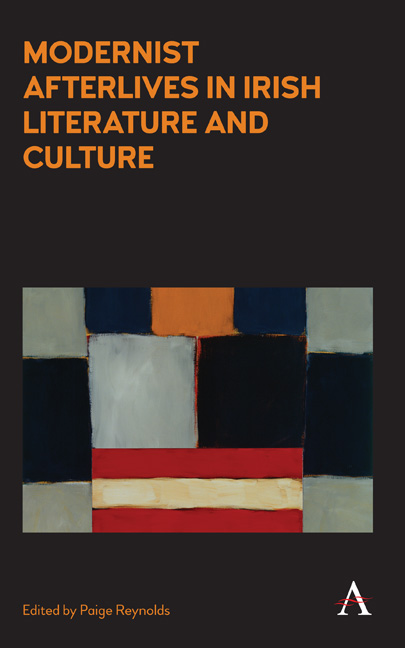Introduction
Published online by Cambridge University Press: 22 July 2017
Summary
Modernist Afterlives in Irish Literature and Culture explores how the themes, forms and practices of high modernism are manifest in Irish literature and culture produced subsequent to that cultural movement. In a bracing set of essays – ranging not only among literary genres, but also among practices such as dance, publishing, design and film – this collection considers how Irish writers and artists from the mid- twentieth century forward engage with modernism as they endeavour to forge new modes of expression.
The character and chronology of modernism continue to be subjects of heated debate, though critical consensus defines literary modernism broadly as a quest to ‘make it new’ (in the words of Ezra Pound) and frequently locates its heyday between 1880 and 1939 – an endpoint coinciding with the start of World War II and the publication of James Joyce's Finnegans Wake. Since the advent of the ‘new modernist studies’ in the 1990s, we have come to accept that modernism spans disciplines and did not unfold exclusively between 1890 and 1922 in a Paris salon, London drawing room or Manhattan gallery. Critics have decisively rebutted the notion that modernism was strictly an Anglo- European or American phenomenon, later adopted elsewhere by ‘marginal’ cultures, by demonstrating that modernist vocabularies, forms and practices emerged in different places at different moments – a recalibration manifest in a new wave of transnational, Atlantic, global and even planetary modernisms. Consequently, not only has the Western derivation of modernism been questioned, but also the temporal boundaries of the movement have blurred as we acknowledge what modernism borrowed from its historical precursors and granted its heirs. When trying to pinpoint the modernist place and the modernist moment, it is hard to get it entirely right, but refreshingly difficult to be wholly wrong. For example, Pascale Casanova has been criticized for her Eurocentric history of literary formations in The World Republic of Letters (2004), a comparativist study invoked by critics of Irish modernism for its account of Irish exceptionalism. But Casanova's traditional understanding of locale is countered by a progressive conception of time when she bounds across historical periods and cites the medieval courts as a point of origin for modern Anglo- European literatures.
- Type
- Chapter
- Information
- Publisher: Anthem PressPrint publication year: 2016



